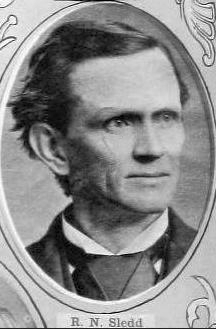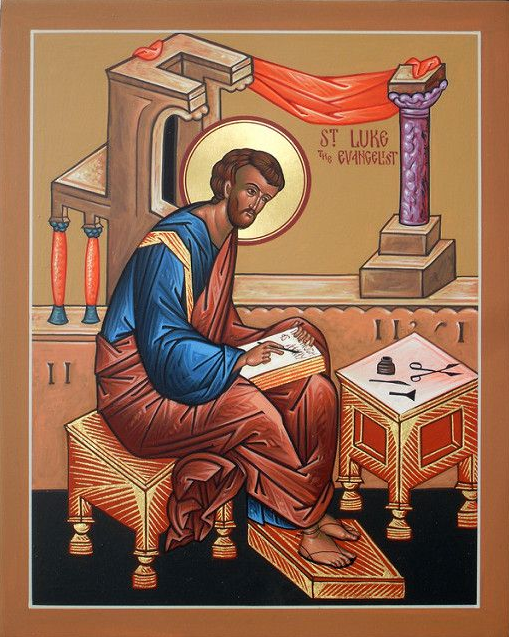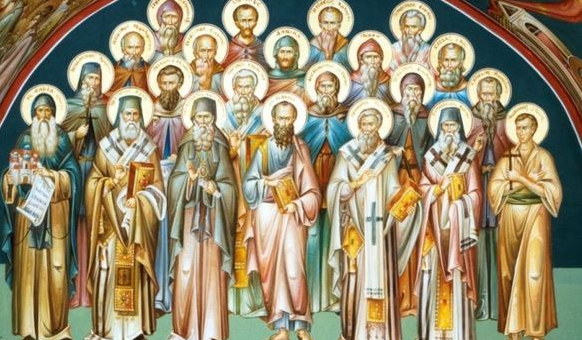Editor’s note: The following is extracted from True Heroism and Other Sermons, by R. N. Sledd (published 1899).
“That thou mightest know the certainty of those things, wherein thou hast been instructed.” — Luke i, 4.
These are the concluding words of the preface to Luke’s gospel. They are addressed to Theophilus — a Greek name signifying a friend or lover of God. He was no doubt a Gentile who had been brought to Christ under the preaching of Luke, or of Paul, with whom Luke traveled and labored. It is believed that he was a man of education and influence, and held official position.
The text sets forth Luke’s specific object in writing to him. He had already received oral or catechetical instruction. But such instruction was liable to misinterpretation; as it passed from one to another it might be added to, or essential points might be omitted; or with advancing years it might fade from the memory. Luke therefore commits it to writing, that Theophilus may have it ever before him in its original purity, and that he may know, and that all subsequent ages may know the certainty of “those things which are most surely believed among us.”
This was the more important because even at that early day many had felt themselves authorized or impelled to record the events of the life of Christ. What a marvelous life that must have been to have awakened such enthusiasm, and to have put so many pens in motion, and this too at a period when the modern passion for writing was entirely unknown! What mere man ever so moved the intellect, the heart, and all the noblest energies of humanity? It is an inexplicable mystery unless Jesus of Nazareth was something more than many of our modern critics would make Him.
These accounts or histories Luke does not criticize or condemn. But he considers them defective and unsatisfactory — defective perhaps in arrangement: hence he proposes to set the facts in order — defective as to fulness — they were mere fragments — detached acts or sayings of Christ, and giving no adequate view of His character and life, and many of them probably mythical, or unauthenticated by reliable testimony. Matthew and Mark had already written their histories. They were accepted as authentic. Luke is not to be understood as referring to them, or as casting any suspicion on their authority. Yet he supplies much that they had omitted, and omits much that they had recorded. Nearly one fourth of his gospel is original.
The human sources of Luke’s information were twofold. He had access to secular history, to which he repeatedly refers in fixing the dates of important events. The canonical narratives of Matthew and Mark were before him, as well as the many fragmentary documents to which he refers in the context. As a faithful historian he would of course examine carefully and critically all contemporary records.
But the chief source of his information was traditional, or the oral testimony of those who “from the beginning were witnesses, and ministers of the word.” He does not profess to have seen what he writes; but declares that he “had perfect understanding of all things from the very first” — that is, that he had, by diligent investigation, traced up everything to its source in order to obtain an exact account of the whole matter. An educated and thoroughly honest man, writing to an educated man, he would naturally be painstaking and thorough in his inquiries. Moreover he was associated with Paul, one of the most cultivated and astute thinkers of his day; and no doubt his work was submitted to that Apostle, and approved by him.
While he carefully sifted the documents at hand, he would no less faithfully weigh the character of the living witnesses. If they were of disreputable character, or imbecile, or if there were sufficient motives to induce them to bear false witness, of course their testimony was worthless. But instead of this they were all found to be not only reputable, but men of the strictest integrity. Their record had been subjected to the closest scrutiny by their own and their Master’s bitterest enemies, and it had come forth from the trial unscathed. Virtuous themselves they devoted their lives to the promotion of virtue and piety among their fellow men. It is true that they were for the most part unlettered men. They had been gathered from the humbler walks of life and were inured to hardship and toil. They were strangers alike to the discipline and learning of the schools, the refinements of polite society and the luxuries of wealth. But they were men of good natural ability, clear perception and strong convictions. And they were as competent to testify to what they saw and heard as a Gamaliel, or any member of the Sanhedrim could be. Nor could they have had any motive to testify falsely. Their education, their inherited prejudices, the prejudices of their nation, were all against their present position. All their worldly interests, and even life itself was imperiled by adherence to the Nazarene. And if they had sufficient motive and sufficient intelligence and courage to devise and attempt such a gigantic imposture, they could have no reasonable expectation of its success. There were multitudes still living who were contemporary with Christ, who would at once have convicted them of false witness had their testimony been untrue. The things to which they testified were not done in a corner, but in the presence of thousands. They were well known through all the land and in Jerusalem itself. It was the truth rather than the falsity of the testimony that excited such deep resentment and opposition on the part of the adversaries of Jesus.
From whatever standpoint the matter may be viewed not the slightest suspicion can be cast on the trustworthiness of the witnesses. Satisfied on this point, Luke asks, What is their testimony? and says, in substance, to Theophilus: “Rejecting whatever is mythical, or not fully substantiated by the evidence, lopping off all exaggerations that have naturally gathered about this wonderful story, the following account is most surely believed among us. We hold it to be absolutely true in every particular. You may accept it as a certainty, excluding completely and forever from your mind the remotest misgiving as to its truthfulness.”
And now he proceeds to record what? Not a formal Confession of Faith, or Articles of Religion, or an elaborate system of doctrine, but the facts — the simple, but sublime facts of the life of Christ — what He did, and said and suffered — His resurrection power and ascension glory. And this is the grand distinguishing characteristic of the gospel. It is not a system of notions, or of speculative opinions, but a series of facts — an authentic history. Its first preachers could all adopt the words of John: “That which we have seen and heard declare we unto you.” Or say with Peter: “We have not followed cunningly devised fables when we made known unto you the power and coming of our Lord Jesus Christ, but were eye-witnesses of His majesty.” And herein has the gospel infinite advantage over all the systems that the genius of men has devised.
Facts are unchangeable. Sentiment is as unstable as the waves; opinion as variable as the winds, and often as false as fickle. The settled beliefs, the convictions of one age are the laughing-stock of the next. Well-nigh the entire realm of speculative inquiry is a scene of agitation, fluctuation and uncertainty. Systems built as men supposed upon the foundation of everlasting principles, with all the elaborate beauty of human genius, and consolidated by the suffrage of ages, like the splendid architectural structures of antiquity, have fallen into hopeless ruin. But facts are immutable. Deeds once done are done forever. The granite cliff that lifts its head above the waters in the calm, when the tempest comes may be buried beneath the billows; but it is the granite still; and when the storm has spent its fury it will again lift its head into the sunshine. Facts may be obscured by passion or prejudice, or pass into forgetfulness. But they are facts still, and forever. The facts of the gospel have been assaulted from every possible stand point, with every conceivable weapon for eighteen centuries. But as each successive blow of the sculptor’s hammer and chisel brings the image into clearer outline, so each successive assault has brought into clearer light both the unimpeachableness of the witnesses, and the beauty and glory of the facts they relate, and has thus entrenched them the more strongly in the faith and love of the race.
Facts appeal alike to all. They arrest the attention and carry conviction to the minds of those who cannot or will not follow a chain of abstract reasoning. The astronomer may spread before the unlettered man a chart of the heavens, point out to him the position and describe the movements of the heavenly bodies, explain to him all the steps in his calculations whereby he reaches the conclusion that at a given time there will be a total eclipse of the sun. The man may wonder, but understands nothing, believes nothing. But the day, the hour, the minute comes, and the moon wheels in between the sun and the earth, gradually obscuring its light, until presently nothing is visible to the eye but a zone of subdued splendor apparently encircling the dark body of the moon. As the man looks on the scene he is thrilled with amazement and awe, and, while utterly unimpressed by the figures and conclusions of the astronomer, he carries the impression of the wonderful fact which he has witnessed through all the years to come. Few persons may know or care anything about the philosophy of history; but how few there are who are not interested in and charmed by its facts. The great multitude can know nothing of theology as a science; they can know nothing of it as a system — an orderly and compact arrangement of profound and glorious truths perfectly adjusted the one to the other and each essential to the harmony, completeness and effectiveness of the whole. But what child cannot grasp the simple facts of the gospel? True, it is the wonderful history of the most wonderful life that was ever lived on earth; and no other life ever ended in darker tragedy or more splendid triumph. But its wonders of wisdom and power and purity, its ineffable tenderness and love, its humiliation and glory, somehow waken responsive echoes in the inner chambers of the soul and take fast hold on the mind and heart and conscience, and live in the memory of the child or the pagan, and move them to a new and higher life when abstract truth would find no avenue to the soul and therefore be utterly powerless to stir the sensibilities or move the will. It is this historic element that makes the gospel susceptible of universal appreciation and commends it to the faith of the ignorant as well as the enlightened. And herein we find one reason why, as a rule, it is accepted by the untutored man more readily than by the highly cultivated: the former accepts and builds his faith and hope on the facts, while the latter, leaving facts in the background, hesitates and stumbles over difficulties of doctrine and questions of interpretation.
Nor can we overestimate the value and the might of facts. They are what we all want when any matter that affects our interests is presented, whether it be secular or religious. A single fact well authenticated, outweighs the strongest argument, baffles the most inveterate prejudice, and overturns beliefs cherished through a lifetime. The missionary finds that nothing is so mighty as the story of Jesus and his love, and that the more simply it is told the more effective it is. The pastor, in his ministrations among the sorrowing, and in the death chamber, finds the same sweet story of old giving the richest solace to the troubled, and courage and confidence to the dying. The cry of every human heart that knows anything of his love is “Tell me more about Jesus, Him would I know, who loved me so; tell me more about Jesus.”
The reality of the facts once definitely ascertained the certainty of the faith can no longer be questioned. Here, if anywhere, we tread on the solid ground of unalterable truth. Accept the history as authentic and the only possible conclusion is that the Son of Man was also the Son of God, “the Lord from heaven” — the final and perfected expression of God’s love to our race — the Prophet, Priest, and King — in whom we have redemption, even the forgiveness, of sins according to the riches of His grace.
Infidelity recognizing the inevitableness of this conclusion, from the days of Julian and Porphyry until now, has been taxing all its resources to invalidate the history. Many have been its hypotheses — some puerile, some subtle and profound — some inspired by malignant hate, and some, it may be, by honest doubt. When Jesus was on trial, it is recorded that, “Many bare false witness against Him, but their witness agreed not together.” So with these opponents of the gospel. They find no common ground of truth on which they can all stand and from which a concentrated attack can be made. The only tie that binds them together is the enmity of the carnal mind against God — a deep all-pervasive, all-controlling hostility to the simplicity, purity, and love of the gospel. The Psalmist says: “The kings of the earth set themselves, and the rulers take counsel together, against the Lord, and against his Anointed, saying, Let us break their bands asunder, and cast away their cords from us. He that sitteth in the heavens shall laugh: the Lord shall have them in derision.” No less impotent and certain of defeat are the counsels of His enemies now. Not a single fact of the gospel history have they been able to discredit after eighteen centuries of effort. Not one single stone in the foundation or in the walls of this glorious superstructure have they jostled out of its place.
The anxiety of some good men has been greatly stirred by what is boastfully called “the higher criticism,” which attempts to reconstruct the word of God and tell us what in it is fiction, and what is fact, what to be believed and what rejected. But the outcome of its work justifies none of its affectation of profounder learning and greater courage and wisdom than belong to other men. And though its exponents and advocates be, in many cases, in the Churches, it is but one of the many forms of infidelity, and they are on the highway to avowed unbelief. But suppose all its claims be granted. Not one essential fact of the gospel is touched. The history remains in all its completeness, originality and glory. The story of Jesus and the resurrection has lost none of its sweetness and power, nor has a single note dropped from the scale of the anthem of our triumph.
But we of the present day have an advantage over Luke and all his contemporaries. We have entered into their labors — enjoy the benefits of all that they saw, and heard, and recorded. But the history was not finished when the pen fell from their hands. Jesus still lives, and has ever been living and moving and working among men. “Lo, I am with you always,” said He, “even unto the end of the world.” He is present in the word, in the soul of the awakened sinner, and in the rejoicing believer — with His servant in his darkest hours of trial, and sorrow, with him in the valley and shadow of death. He is present in the believing family, sweetening its ties, refining and elevating its affections, and glorifying its life. He is present in the Church, in its ordinances, and in all its work, in its struggles and its victories, presiding over its fortunes, and leading it onward to its destiny of universal supremacy and heavenly glory. All the results that have been accomplished by the preaching of the word, by the holy living and dying of the saints, and by the multiplied agencies of the church from the day of Pentecost until this hour are gospel facts. They are the irrefutable demonstration of the certainty of those things in which we have been instructed. This evidence, which has been gathering volume and power through the ages, is all ours. If Luke and Paul and their co-laborers began the working out of the mighty problem, we have the solution; and in the solution we have “assurance doubly assured.”
If now we have had any doubts as individual believers as to our foundation let us bid them be silent. We are not building on superstitious fancies or fears, nor on a mere balance of probabilities in our favor, nor on the doctrinal formulas of this or that church, nor on the church itself; but on the solid, everlasting foundation of fact — the fact of a Christ incarnate, suffering, dying, rising, reigning; the fact that overtops and includes all other facts of the divine love, that reaches up to the throne of God and down into the deepest abysses of human wretchedness and woe, back into the depths of eternity past and forward through all the sweep of our immortality; the fact that “turns earth to heaven, lights life in death, and to heavenly thrones transforms the ghastly ruins of the mouldering grave.” Devils believe this fact and tremble; the angelic powers believe it and rejoice; we believe it and rest. Infidelity has no fact with which to rebut it, or to cast a shadow of doubt upon it. There it stands upon the page of history uncorrupted, and incorruptible forever. “Go ask the infidel what boon he brings us, what charm for aching hearts he can reveal;” and gloomy silence, the jest and sneer, or philosophy and vain deceit, is all that he has to offer. But turn to this wondrous fact, and it distills an unutterable sweetness into the aching heart, calms all its fears, inspires it with lively hope, and fills it with a peace that passeth all understanding. In this gospel of fact we rest secure, certain of our foundation — certain of the issue of our faith.
Nor need we have any fear with respect to the present security and future triumph of the Church. It does not depend for safety on the friendship of men, the patronage of learning and wealth, the prowess of the soldier, or the genius of the statesman. These have all been leagued against it, and active and persistent in their efforts to overthrow it or to stay its progress. But their efforts, instead of succeeding, seem only to have intensified its energy and activity and quickened its progress. It rests upon the bedrock of an eternal fact: “Thou art the Christ, the Son of the living God,” said Peter. “Yes,” and “upon this rock will I build my church; and the gates of hell shall not prevail against it.” And not only does it rest on this fact concerning the person and work of Christ, but, in the exulting language of the Psalmist: “God is in the midst of her; she shall not be moved; God shall help her and that right early.”
Men talk about the decadence of Christianity, and predict its coming overthrow. The truth is it was never more vital and aggressive than it is today. Never was its faith more steadfast, its purpose more determined, its forces more consolidated, or its achievements more splendid. Our own Church is building and dedicating to God one house of worship for every fourteen hours the year round. And it is said that Protestant Christianity opens some new sanctuary for Christ every hour in the year. Instead of decadence there is amazing progress; instead of the gathering shadows of night, the sun in cloudless splendor is riding up the heavens to high noon, and ere long its glory will “burst o’er all the earth.”
God inspire us, as believing men and women, and inspire the Church everywhere with an absolute faith in gospel fact. Such a faith will kindle our love for Christ to an intenser glow, deepen and broaden our sympathies and our interest in humanity, increase our activity, enlarge our hearts and fill us with joy in God now, and rejoicing in the day of Jesus Christ.











Thanks for posting this.